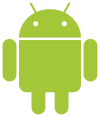Android is a mobile operating system initially developed by Android Inc. Android was bought by Google in 2005. Android is based upon a modified version of the Linux kernel. Google and other members of the Open Handset Alliance collaborated to develop and release Android to the world. The Android Open Source Project (AOSP) is tasked with the maintenance and further development of Android. Unit sales for Android OS smartphones ranked first among all smartphone OS handsets sold in the U.S. in the second and third quarters of 2010, with a third quarter market share of 43.6%.
Android has a large community of developers writing application programs ("apps") that extend the functionality of the devices. There are currently over 200,000 apps available for Android.Android Market is the online app store run by Google, though apps can be downloaded from third party sites (except on AT&T, which disallows this). Developers write in the Java language, controlling the device via Google-developed Java libraries.
The unveiling of the Android distribution on the 5th of November 2007 was announced with the founding of the Open Handset Alliance, a consortium of 79 hardware, software, and telecom companies devoted to advancing open standards for mobile devices. Google released most of the Android code under the Apache License, a free software and open source license.
The Android operating system software stack consists of Java applications running on a Java based object oriented application framework on top of Java core libraries running on a Dalvik virtual machine featuring JIT compilation. Libraries written in C include the surface manager, OpenCore media framework, SQLite relational database management system, OpenGL ES 2.0 3D graphics API, WebKit layout engine, SGL graphics engine, SSL, and Bionic libc. The Android operating system consists of 12 million lines of code including 3 million lines of XML, 2.8 million lines of C, 2.1 million lines of Java, and 1.75 million lines of C++.
History
Acquisition by Google
In July 2005, Google acquired Android Inc., a small startup company based in Palo Alto, California, USA. Android's co-founders who went to work at Google included Andy Rubin (co-founder of Danger), Rich Miner (co-founder of Wildfire Communications, Inc.), Nick Sears (once VP at T-Mobile), and Chris White (headed design and interface development at WebTV). At the time, little was known about the functions of Android, Inc. other than that they made software for mobile phones. This began rumors that Google was planning to enter the mobile phone market.
At Google, the team led by Rubin developed a mobile device platform powered by the Linux kernel which they marketed to handset makers and carriers on the premise of providing a flexible, upgradable system. It was reported that Google had already lined up a series of hardware component and software partners and signaled to carriers that it was open to various degrees of cooperation on their part. More speculation that Google's Android would be entering the mobile-phone market came in December 2006. Reports from the BBC and The Wall Street Journal noted that Google wanted its search and applications on mobile phones and it was working hard to deliver that. Print and online media outlets soon reported rumors that Google was developing a Google-branded handset. More speculation followed reporting that as Google was defining technical specifications, it was showing prototypes to cell phone manufacturers and network operators.
In September 2007, InformationWeek covered an Evalueserve study reporting that Google had filed several patent applications in the area of mobile telephony.
Open Handset Alliance
"Today's announcement is more ambitious than any single 'Google Phone' that the press has been speculating about over the past few weeks. Our vision is that the powerful platform we're unveiling will power thousands of different phone models."
Eric Schmidt, Google Chairman/CEO
On the 5th of November 2007 the Open Handset Alliance, a consortium of several companies which include Texas Instruments, Broadcom Corporation, Google, HTC, Intel, LG, Marvell Technology Group, Motorola, Nvidia, Qualcomm, Samsung Electronics, Sprint Nextel and T-Mobile was unveiled with the goal to develop open standards for mobile devices. Along with the formation of the Open Handset Alliance, the OHA also unveiled their first product, Android, a mobile device platform built on the Linux kernel version 2.6.
On 9 December 2008, it was announced that 14 new members would be joining the Android Project, including PacketVideo, ARM Holdings, Atheros Communications, Asustek Computer Inc, Garmin Ltd, Softbank, Sony Ericsson, Toshiba Corp, and Vodafone Group Plc.
Licensing
With the exception of brief update periods, Android has been available under a free software / open source license since 21 October 2008. Google published the entire source code (including network and telephony stacks) under an Apache License.
skip to main |
skip to sidebar
Blog Artikel Teknologi Informasi (TI), Game, dan Design. Semoga Indonesia semakin maju.
Pages
About Me
- Arie Setiawan
- Arie Setiawan, pekerjaan sebagai Dosen di Fakultas Teknologi Informasi, UKSW - Salatiga. S2: Ilmu Komputer UGM S1: Teknik Elektro UKSW SMA : SMA Lab UKSW
Powered by Blogger.





